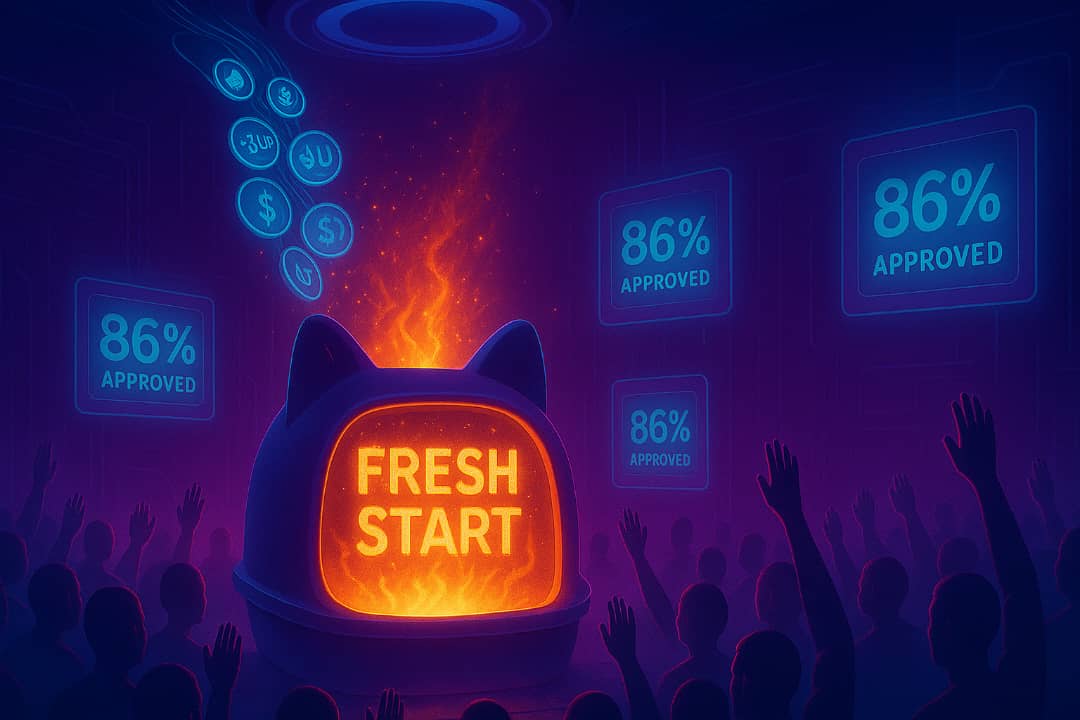
Jupiter’s Litterbox Burn: Reshaping Tokenomics with Community Consensus
The Jupiter community has crossed a significant milestone with the recent approval of the Litterbox Burn proposal. With a commanding 86% majority, the governance vote led to the decision to burn 130 million $JUP tokens — approximately 4% of its circulating supply. This strategic move is part of Jupiter’s broader ‘Fresh Start’ initiative aimed at simplifying its token ecosystem, boosting investor confidence, and realigning the project for long-term success.
The Litterbox Burn: What It Means
Originating from the Litterbox Trust, a fund created earlier this year to safeguard Jupiter’s DAO reserves, the proposal centered around a simple yet impactful question: Should the community hold large $JUP reserves or burn them to increase token scarcity and simplify economics? The Litterbox Trust, which received 50% of on-chain revenues generated from platform fees to buy back $JUP tokens, served as a safety net. However, as the fund swelled, doubts arose over the long-term value of maintaining such reserves.
After rigorous discussion, the decision to burn 130 million $JUP reflects a consensus for clarity and transparency. The move not only reduces the circulating supply but also builds stronger alignment between the community’s goals and Jupiter’s evolving ecosystem.
Why the Litterbox Burn Matters
This isn’t just another deflationary event; it’s a statement of intent. By burning tokens, Jupiter demonstrates its commitment to long-term holders while simplifying its tokenomics. The primary benefits include:
- Improved Token Scarcity: Reducing supply can positively impact the value of existing tokens over time.
- Trust and Transparency: Investors gain confidence knowing there won’t be sudden reserve unlocks from the Litterbox Trust.
- Community Maturity: The vote underscores the increasing sophistication of Jupiter’s DAO, showcasing its ability to execute decisive governance decisions for the greater good.
Market Reactions to the Token Burn
The community has greeted the Litterbox Burn with optimism. Holders and analysts alike see this as a pivotal moment for the project. While the immediate price of $JUP remains stable at approximately $0.35, market experts suggest that the supply reduction could lead to greater price resilience and attractiveness to institutional investors.
As one of Solana’s top-performing tokens, $JUP continues to thrive in its role as a liquidity hub within the decentralized finance (DeFi) ecosystem. The fresh momentum generated by this burn could cement its position as a leader in the space.
Innovation Ahead: Jupiter’s Growth Roadmap
With the burn behind them, the Jupiter team plans to focus on several strategic initiatives:
- Enhanced DAO Reserves: Instead of accumulating $JUP, future revenues may be converted into stable assets, reducing internal price risks.
- Rewarding Long-Term Holders: New programs aimed at providing additional incentives to loyal participants.
- Liquidity Expansion: Strengthening liquidity provision programs to boost trading efficiency.
- Streamlined Governance: Simplifying the token model to create more direct engagement between holders and the protocol’s financial operations.
Suggested Product: Ledger Nano X Cryptocurrency Wallet
If you’re a $JUP holder or a regular trader in the DeFi ecosystem, ensuring your assets are stored securely is crucial. The Ledger Nano X cryptocurrency wallet is an excellent option. With its state-of-the-art security features and user-friendly interface, it’s a must-have for managing your diverse crypto portfolio safely.
Looking Ahead
The Litterbox Burn marks a new chapter for the Jupiter ecosystem. Moving forward, the focus will be on streamlining governance, enhancing transparency, and creating a resilient, community-led economy. For investors and community members alike, this pivotal moment signifies not just a restructuring, but also a reaffirmation of the project’s core values.
As Jupiter continues to gain traction within the Solana DeFi space, the reduced token supply and renewed commitment to transparency positions the project for its next phase of growth. The community has chosen evolution — and the results are already showing promise.





